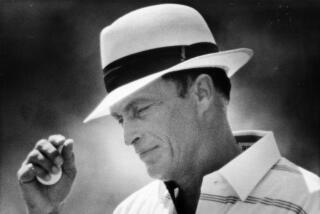Rodriguez, musician rediscovered in âSearching for Sugar Manâ documentary, dies at 81

Sixto Rodriguez, the singer-songwriter who found fame as the subject of the Oscar-winning 2012 documentary âSearching for Sugar Man,â died on Tuesday at 81.
His death was announced on his official website: âIt is with great sadness that we at Sugarman.org announce that Sixto Diaz Rodriguez has passed away earlier today. We extend our most heartfelt condolences to his daughters â Sandra, Eva and Regan â and to all his family.â
No cause of death was given.
Performing as Rodriguez, the Detroit-born artist developed an idiosyncratic blend of confessional folk and psychedelic soul on a pair of albums he released to little attention in the early 1970s. Rodriguez retired from music to work blue-collar jobs in his hometown, but those records found an unlikely audience in South Africa, earning him a cult following that crested in the early 2010s with the release of âSearching for Sugar Man.â
Simultaneously celebrating and puncturing the myths that arose in the absence of concrete facts, the film brought Rodriguez to a wide international audience for the first time. After winning the audience award at the 2012 Sundance Film Festival, âSearching for Sugar Manâ became a word-of-mouth hit, eventually earning the Academy Award for documentary feature. In its review, The Times called the film âan indelible portrait of an artist given a second chance at fame.â
In the wake of the movieâs success, Rodriguez returned to live performances, appearing on âThe Late Show With David Lettermanâ and âThe Tonight Show With Jay Lenoâ and playing concerts into the late 2010s.

The son of Mexican immigrants, Sixto Diaz Rodriguez was born in Detroit on July 10, 1942. He started playing guitar as a teenager, releasing the single âIâll Slip Awayâ on Impact Records in 1967; the record was credited to âRod Riguez.â A pair of music producers, Dennis Coffey and Mike Theodore, saw Rodriguez performing at a local club called the Sewer and brought him to Sussex Records, a subsidiary of the bubble-gum label Buddha launched by Clarence Avant, a former Motown executive.
Rodriguez recorded his 1970 debut, âCold Fact,â with Theodore and Coffey producing. Equal parts mellow soul and plaintive folk, âCold Factâ contained songs such as the trippy âSugar Manâ that would have sounded at home next to Jose Feliciano, Stevie Wonder or Cat Stevens on AM radio â the groove was funky enough to be sampled by Nas on his track âYouâre Da Manâ in 2001 â but Sussex failed to generate interest in the album. Rodriguez headed to London to cut a follow-up, âComing From Reality,â but within months of its 1971 release, Sussex released him from his contract.
Back home in Detroit, Rodriguez retired from music. He worked construction jobs as he earned a bachelorâs degree in philosophy from Wayne State University â heâd later earn an honorary doctoral degree from the institution in 2013 â and raised a family. He went on to work as a political activist, campaigning against police brutality and advocating for the poor. He ran for mayor, state senate and city council, never winning a race.
As Rodriguez pursued a life after music, âCold Factâ found its way to audiences in Australia. Concert promoters invited Rodriguez to play the country in 1979 and the musician was surprised to discover large crowds awaiting him. He returned to Australia in 1981, sharing the occasional bill with politically minded rockers Midnight Oil. At the time, Rodriguez considered those appearances to be âstrange flukes,â but they planted the seeds of a cult following that blossomed in the decades to follow.
Rodriguezâs music also attracted fans in South Africa, who found his socially progressive songs resonant during the age of apartheid. Lacking any hard facts about the singer-songwriter â very little was written about him in America, let alone in South Africa â fans speculated about his history, inventing such outlandish stories as Rodriguez dying by suicide onstage or from a drug overdose.

By the late 1990s, music journalist Craig Bartholomew Strydom and Cape Town record store owner Stephen Segerman set out to discover what had become of Rodriguez, launching a website called âThe Great Rodriguez Hunt.â Rodriguezâs daughter Eva learned of the site, leading to the musician playing a handful of shows in South Africa in 1998. The website and shows kicked off a resurgence that continued when the boutique indie label Light in the Attic reissued both of Rodriguezâs albums in 2008.
Around this time, filmmaker Malik Bendjelloul met Segerman and realized the hunt for Rodriguez contained the seeds of a great film. Bendjelloul structured his film as a detective story, which was key to its appeal. âWhat sets âSearching for Sugar Manâ apart,â The Times noted in 2012, âis the way in which the filmmaker preserves a sense of mystery in the telling.â
The film won the Oscar for documentary at the 65th Academy Awards in 2013, culminating a near-sweep of eligible awards since its premiere at the 2012 Sundance Film Festival.
âSearching for Sugar Manâ became the rare music documentary to find a wide audience. The Dave Matthews Band covered âSugar Manâ in concert in 2013 and â14 â Matthews said Rodriguez was âone of my heroes growing upâ â and Beach Boy Brian Wilson brought Rodriguez out on tour. In addition to network television spots, Rodriguez performed at Coachella and at Englandâs Glastonbury festival.
After a stroke in the late 2010s, Rodriguez lost his ability to sing and play guitar. By 2019, he was able to play music again but the COVID-19 shutdown canceled several planned 2020 gigs. In July 2023, he appeared onstage at a concert celebrating his 81st birthday.
Speaking to the Detroit News in 2008, Rodriguez summarized his journey: âItâs been a great odyssey. All those years, you know, I always considered myself a musician. But, reality happened.â
More to Read
The biggest entertainment stories
Get our big stories about Hollywood, film, television, music, arts, culture and more right in your inbox as soon as they publish.
You may occasionally receive promotional content from the Los Angeles Times.










